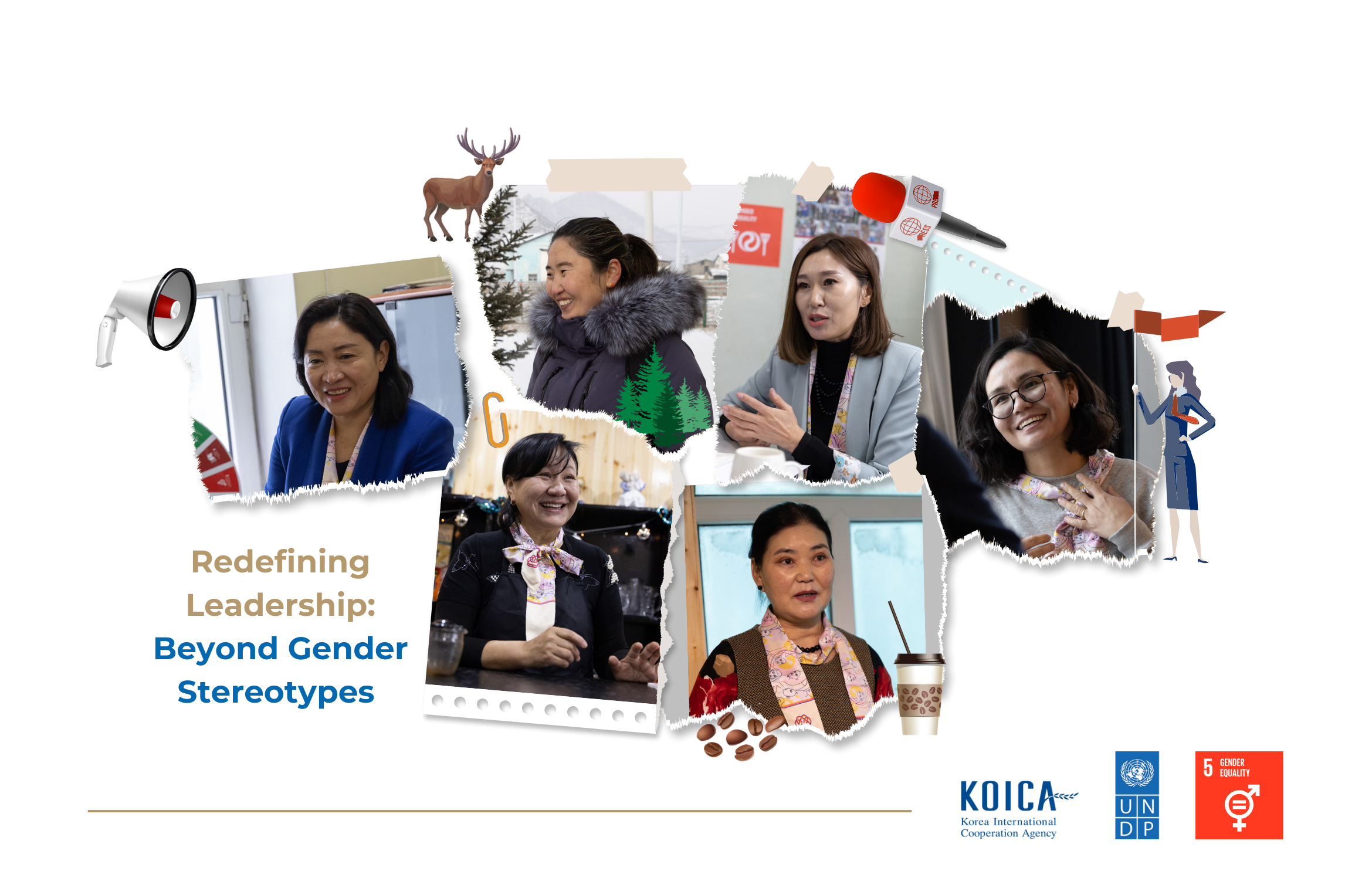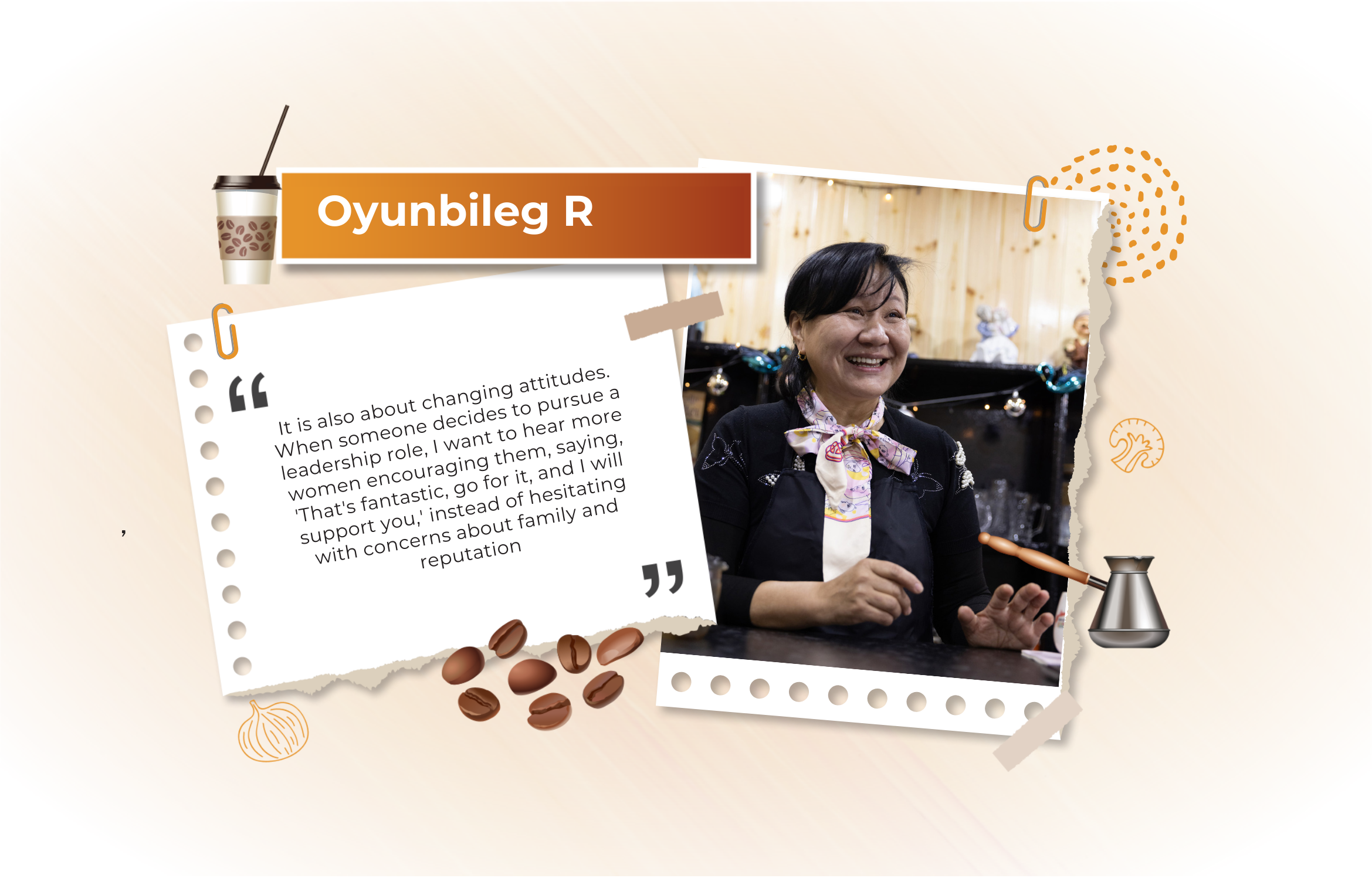Redefining Leadership: Beyond Gender Stereotypes
January 24, 2024

Men leaders.
There is something odd about these two words. Should it not say just ‘leaders’?
Women leaders.
These two words, on the other hand, seem normal. But are they?
This is an example of how deep gender-based stereotypes are ingrained in society.
The power of words lies not just in what they say, but in what they silently acknowledge, shaping our perceptions, beliefs, and the very fabric of society with every mention.
Nine out of ten people in the world has at least one gender-based bias in the world according to UNDP’s 2023 study. Sadly, this number is much closer to ten out of ten in Mongolia.
In Mongolia, grassroot initiatives are actively working to challenge age-old patriarchal values and norms that perpetuate gender-based stereotypes mainly focused on the capital city. However, there is a growing need to expand these efforts nationwide reaching rural areas where the stereotypes are even more common.
One of such initiatives responding to this need is Women’s Leadership Network of Mongolia (the Network), a nationwide grassroots movement with almost 2,000 members supporting each other across political affiliation, initiated under UNDP’s project funded by the Korea International Cooperation Agency.
Arkhangai province, located 500 kilometers away from the capital city, is among the first provinces to establish the Network’s Local Circle in 2022. Since then, local leaders have been supporting and mentoring each other by providing knowledge and information required to participate in politics, run for decision-making positions, and hone their leadership skills.
Battsetseg Batjargal, veteran in the local and national political scene, is one of the early founding members and Coordinators of the Network’s Arkhangai Local Circle. According to her, changing people’s attitudes and perception of leadership have been the biggest fork-in-the-road, and believes that concerted effort from all is crucial to do so.
"Our goal through the Network is to address and dismantle not only the gender stereotypes imposed by men on women but also to encourage a shift in the attitudes of women themselves. So, all we need to do is to empower women and equip them with tools to pursue decision-making roles.”

Indeed, such change is afoot in Arkhangai, particularly, among young leaders. Almost two thirds of Mongolia populations are young people below the age of 35 which signifies both the sheer influence and importance of youth participation in decision making.
“I don’t want to conform to the stereotypes. Women are expected to wear make-up and elegant clothing in public. And they still get criticized if others see flaw in their clothing or make-up. That is why I don’t wear make-up and prefers minimalist style. And it makes me more comfortable with one less thing to worry about at work and in public. Through the Network, I am gaining confidence as a leader along with change in my perceptions towards politics” says Tserenlkham Batbaatar, member of the Network and career environmental protection expert.

Another young leader Bayartsetseg Ganbat joined the Network as Coordinator with an aim to represent young people and help the Network members to advance their skills via personal development. While she is confident of the many positive impacts that the Network will bring to Arkhangai, she also sees challenges.
“Since I joined the Network, I noticed that women have to be extra courageous when entering politics or pursuing decision-making roles. Because when women are elected or appointed in decision-making roles, their personal lives and family are put on scrutinized public standards as opposed to men. This makes their lives very challenging” says Bayartsetseg.

Echoing Bayartsetseg’s sentiment, local media figure Tsevegmid Kh, talks about how her perception about politics and leadership are changing since she joined the Network and says “I make sure that I interview both women and men when I cover my news segments to ensure gender balance in my sources. This is my way of challenging the gender biases in the media.”

Gender bias is a pervasive problem worldwide. It constrains women’s choices and opportunities by regulating behaviours and setting the boundaries of what women are expected to do and be.
In Arkhangai, childhood friends, Oyunbileg and Urantsetseg, who are reunited after retirement, are challenging these biases together through the Network.
“One of the key progresses I am hoping to see from the Network is increased level of support among women, for women. With a strong network of mutual support, our collective impact can be significantly increased” says Urantsetseg.

“It is also about changing attitudes. When someone decides to pursue a leadership role, I want to hear more women encouraging them, saying, 'That's fantastic, go for it, and I will support you,' instead of hesitating with concerns about family and reputation,” says Oyunbileg.

Challenges being faced by these courageous leaders of Arkhangai province are no different from that of a global challenges on achieving gender equality. But it is inspiring to see how they are pushing back against gender-based stereotypes by working together through the Women Leadership Network.
In Mongolia and beyond, it's time to redefine leadership, to remove gender qualifiers, and to recognize leaders for their merits, not their gender.
We call on societies, organizations, and individuals to challenge stereotypes, support inclusivity, and empower all leaders, regardless of gender.
The narrative is changing – we can all be a part of this transformation.
***
Written by Erdenesukh (Sukhee) Otgonbayar, Communications Analyst, UNDP in Mongolia

 Locations
Locations



